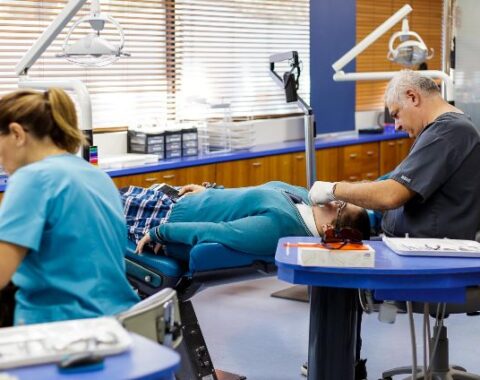Underbites, we all have a vague idea of what they are. But when it comes to their actual definition, what causes them and how they treated this isn’t as clear.
So let’s get the nitty gritty on what is an underbite, what can cause them and how they’re treated by an orthodontists.
What is an underbite?
Underbites are pretty simple in their definition, an underbite is when your lower teeth sit more forward than your upper teeth. A bad underbite can create a bull-dog like appearance in your face and mouth.
The severity of underbites can vary, some severe cases cause the lower teeth to extend forward very far while other can be milder and nearly unnoticeable
An underbite is more than just a cosmetic issue. Depending on the severity of your underbite, it can cause some oral health problems like:
- Difficulty biting and chewing food
- Difficulty speaking
- Pain in your mouth and face
What causes underbites?
Like most malocclusions (a Latin word that means bad bite), underbites are mainly caused by genetics but there are some other factors that can cause underbites as well.
Some other factors include:
- Thumb sucking
- Tongue thrusting or pushing on the teeth with the tongue
- Extended pacifier use
- Extended bottle feeding
Genetics
You’d be more likely to develop an underbite if one of your parents also has an underbite. Your genetics is mainly responsible for a person’s jaw alignment as well as your tooth size and shape.
Injury
Sometimes if you have an injury to the face, it can cause permanent damage to the jawbones. Although fixing and repairing the broken jawbones is more than possible, there is a slight chance that they may not fit together properly after being realigned resulting in an underbite.
How are underbites treated?
When it comes to treating underbites, there are some serious health benefits to fixing your underbite. Your teeth will become easier to clean which lowers your risk for tooth decay and gum disease.
You’ll also feel less of a strain on your teeth, jaw and muscles. One of the common symptoms of underbites is Temporo-mandibular Joint (TMJ) disorders, TMJ symptoms include:
- Pain in your jaw
- Earaches
- Headaches
- Difficulty chewing and more
By correcting your underbite, you can alleviate the majority of these commonly associated problems.
Most underbites can be treated by common orthodontic treatments such as:
- Metal braces
- Ceramic braces
- Clear braces
- Lingual braces
- Clear aligners
- Invisalign
The best way to know which treatment option is the best fit for you is to consult an orthodontist first. At your first consultation the orthodontist will walk you through all the treatment options in detail.





